Moon Under Water - Interview
by John Clarkson
published: 6 / 11 / 2019
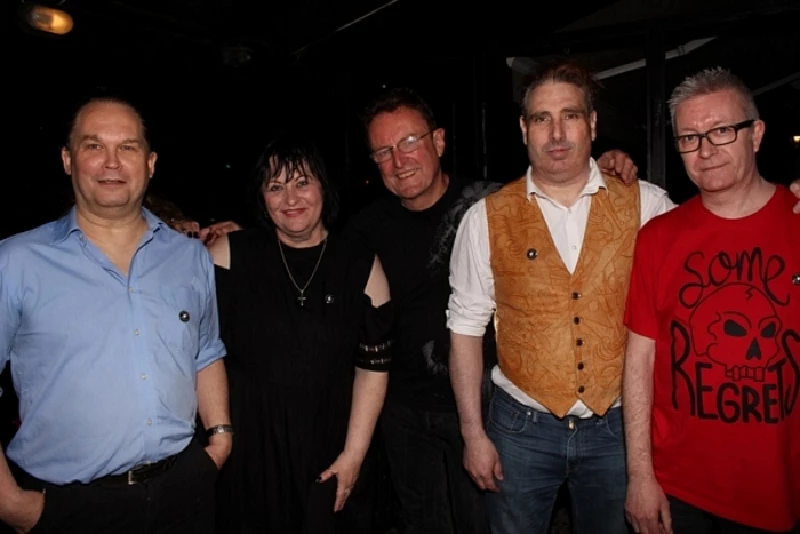
intro
John Clarkson speaks to Moon Under Water about their unusual beginnings after forming at an Adrian Borland tribute night, their memories of him and their plans for an album of original material.
The career of The Outsiders/Sound frontman and solo artist Adrian Borland has gone through a posthumous resurgence of interest in recent years. ‘Walking in the Opposite Direction’, a 2016 film documentary which was produced by Jean-Paul van Mierlo and directed by Marc Waltman, won Borland a new audience and also the approval of his regular fan base. It highlighted the talent and caught the emotional turmoil of the South London cult artist. The enthusiastic van Mierlo has as well set up a record label Stichting Opposite Direction within the already well-established label Sounds Like Haarlem to reissue Borland solo releases and lost recordings. In 2016 Italian writer Giuseppe Basile also published a biography, ‘Adrian Borland & The Sound: Meaning of a Distant Victory’. Former Sound drummer Mike Dudley meanwhile established in early 2018 a tribute band In2TheSound with Carlo van Putten, who worked with Borland in White Rose Transmission, one of his many side projects. Perhaps most moving of all is, however, Moon Under Water, which - formed by three of Borland’s closest friends and an ardent fan - came together in late 2017 without a name for a planned one-off gig to commemorate what would have been his 60th birthday at a tribute night, and have now become a band writing and recording their own material. Adrian Borland’s musical career began as a teenager and the frontman with punk group The Outsiders, who self-released two albums, ‘Calling On Youth’ (1977) and ‘Close Up’ (1979). After they broke up in late 1979, he formed The Sound, who quickly signed to Warner Brothers’ offshoot Korova Records. Their first two LPs, ‘Jeopardy’ (1980) and ‘From the Lion’s Mouth’ (1981), combined an anthemic new wave sound with introspective, soul-searching lyrics and earned them critical acclaim, but an experimental and discordant third album, ‘All Fall Down’ (1982), was less well received and led to them being dropped. The Sound recorded two other albums, ‘Heads and Hearts’ (1985) and ‘Thunder Up’ (1987), which were released on independent labels. In their latter years, Borland was, however, diagnosed with a schizoid-afflective disorder and was sectioned on various occasions, which ultimately forced The Sound’s break-up in early 1988. He began an undervalued solo career and recorded another five albums, but would be plagued on and off by mental illness for the rest of his life. There were times in which he would hear voices and hallucinate. He had tried to kill himself several times before, and died on the 26th April 1999 after throwing himself in front of an early morning train at Wimbledon Station. Moon Under Water’s frontwoman Audrey Eade sang backing vocals on Adrian Borland’s 1989 debut solo album, ‘Alexandria’. Their drummer Adrian Janes was the drummer for and wrote the lyrics for much of The Outsiders’ two albums. Elliot Wheeler, their guitarist, also plays guitar in the Gothic group The Society and industrial act BFG, and considers Borland and The Sound to be one of the great influences on his own musical career. Moon Under Water began to take shape when Audrey Eade met Wheeler on the day of the London and UK premiere of ‘Walking in the Opposite Direction’. They were soon joined by Janes, who returned to making music after an absence of 38 years, and latterly by Audrey’s husband Rob on bass. They have now released seven songs of their own material - ‘Nostalgia for Now’, ‘Lifetime’, ‘Survivors’, ‘Turn to Me’, ‘Strangers’ and most recently ‘Reflective’ and ‘Golden Age’ - on YouTube as well as two Sound covers, ‘Winning’ and ‘Temperature Drop’. While there is inevitably an element of Borland ‘s influence in their music and they have a similar brooding quality, they carry much of their own as well with Audrey’s ethereal vocals, Janes’ sturdy drumwork and Elliot Wheeler and Robert Eade’s haunting, reflective guitar work. After playing the 60th birthday gig in December 2017 at The Cavern in Borland’s native Raynes Park in South London, Moon Under Water returned to the same venue for another tribute night, this time to commemorate the 20th anniversary of his death in April of this year. Moon Under Water also made their debut with a set of their own material at The Musician in Leicester in March, and will be going back there for another gig on the 22nd December. Pennyblackmusic caught them at the second tribute night in The Cavern, where they opened with ‘Lifetime’ before playing a set of Outsiders’ material, which saw them joined by Outsiders’ bassist Bob Lawrence for six songs. We were so impressed that we offered them a slot on our next London Bands ‘ Night bill with The Band of Holy Joy and Dream Maps at The Water Rats on the 17th January, where they will be playing a set of original material. We spoke to all four members about Moon Under Water’s unusual beginnings, their memories of Adrian Borland and their plans for an album. PB: ‘The Moon Under Water’ was a 1946 essay in which George Orwell described his imaginary favourite pub. Is it from that which Moon Under Water takes its name? AUDREY EADE: Yes and no – We’re all Orwell fans, so we all knew about it being the name of ‘the perfect pub’ in his essay. The Moon Under Water pub in Leicester Square (named from the Orwell essay) was where Elliot and I first met in person on the night we went to the ICA for the London premiere of ‘Walking in the Opposite Direction’. We then joined Jan (Adrian Janes is always Jan to me!) at the ICA, so The Moon Under Water was the starting point of the evening that triggered the chain of events that led to our formation as a band. Finding the right name for a band is so hard. We wanted it to mean something. ROBERT EADE: We were having difficulties finding a name, and when the idea of using the name of the pub where Audrey first met up with Elliot - it seemed appropriate. PB: You had all been friends with Adrian Borland and first formed for a one-off gig to celebrate what would have been his 60th birthday in December 2017. How quickly after that did you decide to carry on and move away from simply being a tribute band? ELLIOT WHEELER: I will always make myself available especially if there is a connection with The Sound. We had one or two meetings in London in which Audrey, Jan and I spoke about a possible band or project. We wanted to do something as a 60th birthday celebration for Adrian Borland, then see where fate led us. ADRIAN JANES: I think it was very soon afterwards. We really enjoyed the experience of playing together, but at the same time we didn’t want to be a tribute band, so it followed that we had to start writing our own songs. AUDREY EADE: The 60th birthday tribute gig idea came about in April 2017 after we’d been to see the film at the ICA. I was on the red-eye train back to Leicester with Kevin Hewick, and it was actually his suggestion that we should do something to celebrate what would have been a milestone birthday for Adrian in December 2017. So, Kevin and I sounded out Elliot and Jan who were keen to do it and then we asked a few others – Iv Webb, Simon Breed, James Walton- Ingham and Pat Rowles, all who had worked with Adrian in one way or another and Martijn Prins, who was the cinematographer on the documentary and also plays bass – if they’d be interested and they all agreed. We were never a tribute band – it was all just individual musicians getting together for a one-off evening of covers of Sound/Adrian/Outsiders songs. ELLIOT WHEELER: The night of the 60th birthday celebration was Adrian Janes’ first time behind a drum kit for 38 years. We contacted a few friends that Adrian Borland had worked with and began to form something for a fitting tribute. It was a great honour that everyone gave their time for Adrian Borland and Colvin 'Max' Mayers. Michael Dudley, The Sound’s drummer, flew over from Spain and played on drums that night for a couple of songs. Kevin Hewick, who released a joint 12" single on Cherry Red in 1983 with the Sound and supported them twice back then, also played a set, and Pat Rowles, who was the bassist on Adrian Borland’s last solo album ‘Harmony and Destruction’, came on stage and played 'Start Over' with us. It was a really powerful moment that meant such a lot. After that, we pretty much decided to carry on without a huge discussion and everything just fell into place. AUDREY EADE: Jan, Elliot and I agreed we had really enjoyed working together and, as Jan’s songwriting muse had returned, he now also needed a vehicle for his lyrics. We decided to carry on and, although I was a bit reticent at first, Elliot convinced me I should, so the as yet un-named project started. Robert joined us on bass a bit later. PB: You obviously owe Adrian Borland an enormous debt. What are your main memories of him as a musician and a friend? What do you think he would have made of Moon Under Water? ADRIAN JANES: I think I mainly recall him as someone, at his best, spilling over with ideas and enthusiasm and doing his best to make you share them. Humorous too – when he first started raving about Joy Division, he (as a boyhood Tin Tin fan) observed to me “The bass player looks like Captain Haddock!” As far as Moon Under Water goes, I feel he would have been encouraging, but also that he would have found it difficult to resist putting in his own suggestions. AUDREY EADE: Adrian Borland was a wonderful songwriter and performer and I was already a fan of The Outsiders and The Sound before I met him and Jan back in the 80s. He was quick-witted, intelligent, opinionated, very funny when he was on form and always passionate about his own music and the music he loved. But he had his demons and we all know how that ended. We were very close, mutual confidantes, and I still miss him very much. I think he would have liked Moon Under Water but would certainly have provided some “constructive criticism”! It's a paradoxical question though, because, if he was still here, we wouldn’t exist as a band. ROBERT EADE: He was a passionate musician and as such liked listening to and critiquing other people's music. It's a shame he missed out on the internet age, he would have loved discovering new music that way. I think he would have shown a real interest in what we are doing and would have been quite free and liberal with his advice and suggestions! ELLIOT WHEELER: I joined a local band back in 1987. They were all five years older than me and the bass player asked whether I was influenced by The Sound, as he was impressed by my guitar textures and tones, I was influenced by many new wave bands - Joy Division, New Order, Kevin Hewick, Public Image Limited and A Flock Of Seagulls – but I had never heard them, so, after a few rehearsals, he played me 'From the Lions' Mouth' on cassette. He played side two first and when I heard ‘Fatal Flaw’, its first track, I was totally blown away. It was like a switch just flickered inside my head. It was as though I watched myself, living the same life again, returning back to something that was unlocked. The following day I purchased everything I could by The Sound. I visited a local record shop. The shop owner, who was a friend, knew all about them, so it became a passion after that, collecting everything and researching everything that was connected to them. So, the rest of 1987 for me was spent visiting record shops in Chester, Liverpool and Manchester searching for The Sound, The Chameleons and The Comsat Angels’ entire back catalogue. Adrian Borland and Adrian Janes both have a wonderful way and a profound understanding with words, which is heartfelt and sensitive, and taps into the very essence of my soul, I was always impressed and influenced by their lyrics and that carried on over the decades since I was a teenager into my musical career, and even now. My all-time favourite lyrics are “Hanging above me like a bird of prey that torments my life” from ‘Start Over’ by The Outsiders, and “Should you let the chance slip/To see it crack as it hits the floor/You can't hold onto it or hang on to what you had before” from ‘One Thousand Reasons’ by The Sound. PB: Adrian, you had been retired from music for almost forty years before starting over again with Moon Under Water. What have been the most difficult and best things about picking up the drumsticks again? ADRIAN JANES: The most difficult has been loosening up and relearning co-ordination. It’s also more tiring than it used to be! But the positive side is just the pleasure in helping to create new songs. PB: Rob, you had similarly not played bass for thirty years before forming Moon Under Water. Had you been in bands before then? ROBERT EADE: I'd always wanted to be in a band from about the age of thirteen. It was a dream for me even though I had no experience of playing any instrument. I did form a band in the early 80s after finally deciding bass was the instrument for me. We were all young and quite green at the time but we practiced a lot and did a few gigs in South London until the mid 80s. I wasn't particularly proficient on bass, but the punk ethic hadn't yet totally evaporated in music and I thought we had some good ideas. Unfortunately, some health issues at the time meant I had to call it a day with the band. And then shortly after my bass was stolen in a burglary. By that point I had lost the enthusiasm for music making. I'd been interested in going back to trying to make music for several years prior to Moon Under Water with the advent of cheap software recording options and had dabbled with Cubase but with no real focus. When the Moon Under Water option came up, it was both unnerving and tantalising. I got a new bass and had to almost start from scratch. It's still daunting after so many years, but I am totally enjoying being able to be a part of the band and its creativity and I love the equal input we all have into the creative process. PB: Elliot, you also play in the Gothic group The Society and industrial act BFG. You already must be quite busy. Why did you decide to become involved in a third band? ELLIOT WHEELER: Audrey Eade was a name I long recognised from the ‘Alexandria’ album from 1989. It feels odd but three decades ago it already felt like I knew her. I always seem to follow fate without question. Whichever avenue opens up tends to lead to another path or open door, another realm, within, from or beyond. Over the last decade and, especially through social media connections, I have been fortunate enough to work alongside musicians I have been influenced by for decades, and to connect with musicians from The Sound, The Chameleons and The Comsat Angels, and with The Danse Society, BFG and now Moon Under Water, to work with and alongside musicians I respect and deeply appreciate. PB: Audrey, you trained as a mezzo soprano as a teenager. How did you go from that to fronting Moon Under Water? You also sung on Adrian Borland’s debut album under his own name, ‘Alexandria’. What do you recall of that experience? AUDREY EADE: Ha, the vocal training! My music teacher at school was convinced I was going to be the next Maria Callas or something, so I was sent off to a vocal coach from about the age of eleven, but I got fed up singing arias and bloody ‘Ave Maria’ at people’s weddings and gave up in my mid-teens - punk and boys were much more interesting! I did, however, learn how to breathe and phrase, and amazingl, I find I still know how to use those techniques now. I never really had any interest in fronting a band before – I preferred to listen to music rather than make it, although my friendship circles have always been around musicians. I've always liked the company of creative people. How I ended up singing on ‘Alexandria’ is a very long story, so I’ll give you the abridged version. Adrian was going through one of his more stressed out periods. His mental state always deteriorated when he was recording. Anyway, he managed to break his left hand in the middle of recording the album, and I ended up in A&E practically all night with him and the next day he had to go back and have it plastered, and he insisted I went with him again, even though I’d only had about two hours sleep. When we finally emerged from the hospital, he decided to tell me he was due in the studio and again insisted I go with him – he knew the reaction he was going to get and needed me for moral support. When we got there, everyone obviously immediately saw the fingers to elbow plaster cast, so you can just imagine the reaction...he was due to do some guitar work but guitars were obviously out of the question, so it was decided that backing vocals were the order of the day. I’m just sitting there, totally exhausted and minding my own business, and Adrian marches up to me with the immortal words, “You can sing a bit. Make yourself useful.” Charming! But I did “make myself useful” and I'm glad to have played a small part in a fabulous album. The other strange thing is, if I hadn't done, I'd probably never have met Elliot. PB: Adrian, you write all the lyrics. You wrote the lyrics for most the early Outsiders material as well. Has Moon Under Water been again your first experience of writing lyrics in almost forty years? ‘Turn to Me’, to give one example, is about people’s increasing inability to communicate with each other except through social media. Do you write about what is bothering you at the time? ADRIAN JANES: It has certainly been my first experience of writing complete lyrics for many years, although every so often I’ve jotted down odd lines and fragments. But I never developed them before now as there was no outlet for them. As for the lyrics I’m writing now, I think they’re probably more concerned with personal relationships and also more born out of life experience. They have to be, really, as the lyrics I wrote for the Outsiders, and a few for the Sound, were written in my teens and early twenties. Even ‘Turn to Me’, which is a kind of social comment, really stems from personal relationships. PB: Adrian lives in Basildon, Ellliot lives in Liverpool and Audrey and Rob are in Leicester. That must make things difficult with regard to songwriting, rehearsals and recording. How do you get around that? AUDREY EADE: It is very complicated. The drum kit lives in Leicester – Jan has no room for it, so the only time he gets to play it is when he comes to Leicester. We all work full time jobs too. Elliot does the weirdest shifts ever, including nights and occasional weekends and Jan and Robert both have to work some Saturdays, so getting together is a logistical nightmare! Add to that Elliot’s other band commitments and it’s a miracle we ever get together at all! We tend to meet up in Leicester as it’s central and we have room to put the others up and, in all honesty, we also like Deadline Studios in Leicester where we recorded all our early material. But getting all the stars to align is very difficult and we don’t get together nearly as much as we’d like to. ROBERT EADE: It's difficult. It means we don't get to rehearse and record as much as we would like. But the commitment to the music somehow sees us through that. We have our own way of building a song from scratch and given the distances between us it works quite well, so that by the time we do get together the songs are pretty well formed and it's just a case of getting the band performance to gel AUDREY EADE: Our songwriting technique is pretty unorthodox - Elliot sends me random video recordings of him playing chords on acoustic guitar, Jan sends me lyrics. I decide which tunes match which lyrics and then I work the lyrics into a melody line around the chords, record a rough demo with vocals and then we all work on building it from that point into a proper song. ELLIOT WHEELER: The current writing process is like unfolding a large map or construction plan. Everyone will create ideas as it happens. When I come up with a musical idea, my son will record me on an acoustic guitar and that footage will be sent to Audrey. Once she has decided which lyrics from Jan fits that music or theme, then the writing process will unfold naturally. PB: Audrey and Rob, you have recently bought your own home recording equipment. What are going to be the benefits of this for the band? AUDREY EADE: It was borne out of necessity – we hadn’t rehearsed for months and we wanted to work on our new songs too. The only time we could get together in the last few months was a small window in August and Deadline wasn’t available. We didn’t want to keep putting things off, so Robert made an executive decision and bought the equipment so we could record and mix at home. We had a fair bit of equipment and software already, but now we have a 32 track Tascam too! Our first attempt with it isn’t too bad at all really and we have just put two of the songs from that session - ‘Golden Age’ and ‘Reflective’ - up on YouTube. ROBERT EADE: It's both a cost and a convenience benefit really. It does mean that Elliot and Jan can record their parts and me and Audrey and I can re-record ours later if necessary. Of course, the downside is that as I'm no expert at mixing, and some of that pro studio sound is missing. PB: So far your recordings have been limited to YouTube. Do you have plans to eventually release material digitally or physically? Will there be a Moon Under Water album? ADRIAN JANES: I certainly hope we can make an album during the coming year. We’ve recently recorded more demos, and there are some other songs we’ve yet to work on together, so I think we’ll have enough material. We haven’t discussed possible formats. Being old-fashioned, I favour CDs. ELLIOT WHEELER: In a way the process has automatically returned back to the early Outsiders days who also recorded at home. Hopefully we will record and release something next year. We have got a few more ideas ready to be pieced together. ROBERT EADE: The plan is to record an album. I'd love to see our name on a piece of quality vinyl! AUDREY EADE: We've stuck to YouTube so far because, good quality though they are, our recordings to date are just demos and we're just testing the water really. The plan is that once we have enough songs that are good enough in our eyes and have garnered some approval on YouTube, we'll re-record them all properly for the album, probably at Deadline, some time next year. Hopefully we'll get them out on all the usual platforms and on CD, but my personal preference would always be vinyl. PB: Thank you. Photos by Alan Bell PhotosNi Moon Under Water will be playing at our next Bands Night with The Band of Holy Joy The Water Rats in London on January 17th. Tickets are £8 in advance from www.wegottickets.com and £10 on the door.
Band Links:-
http://www.facebook.com/moonunderwater1Play in YouTube:-
Have a Listen:-
Picture Gallery:-
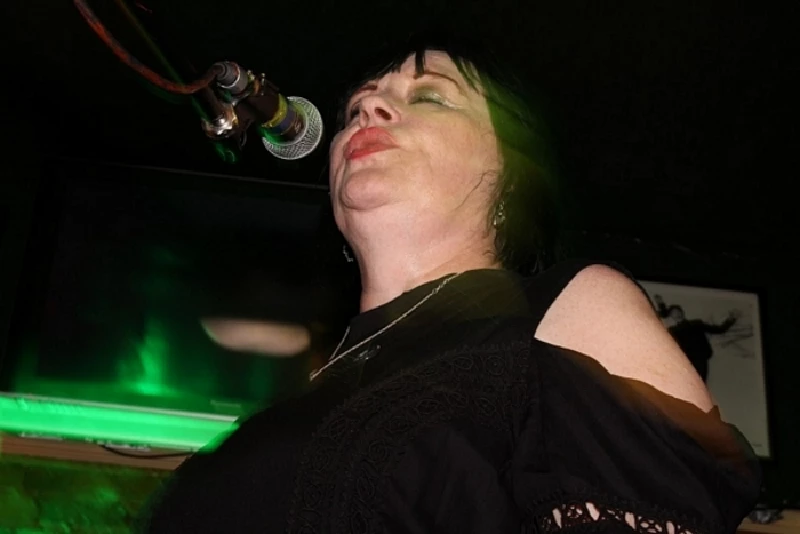
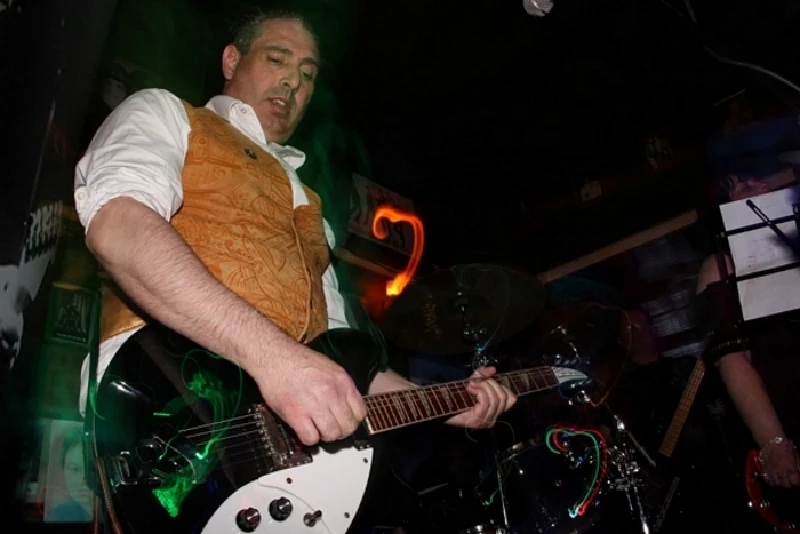
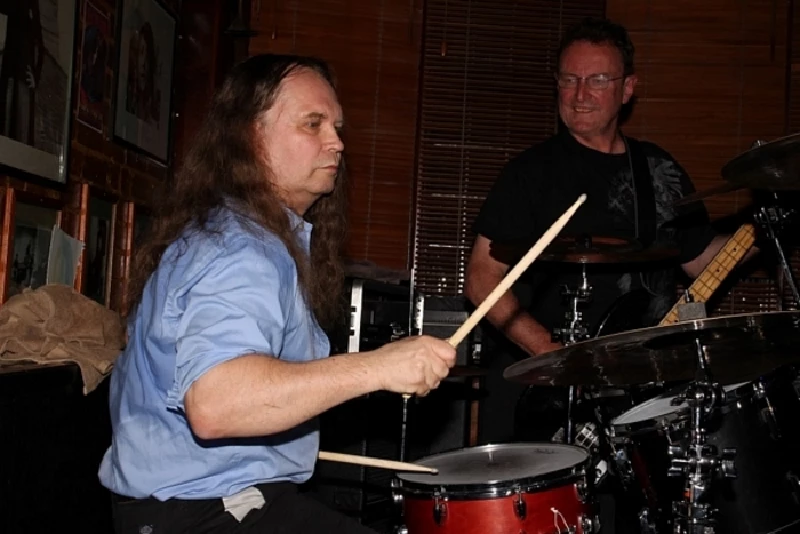
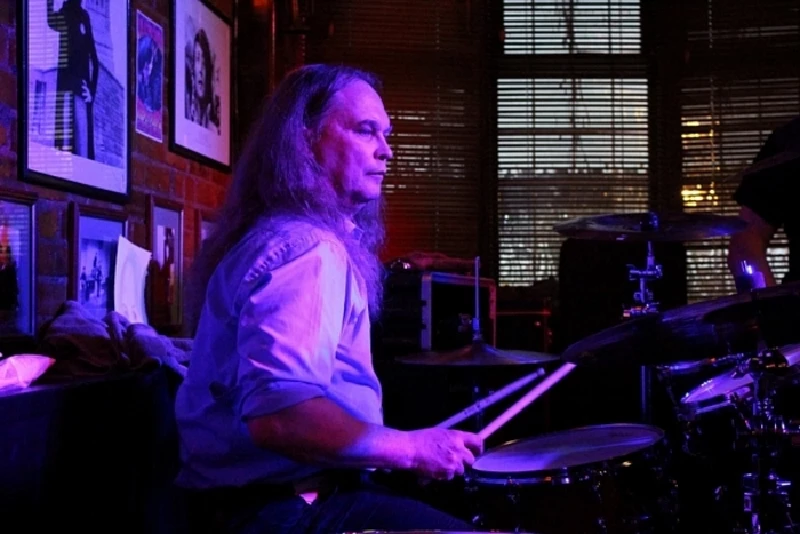
live reviews |
|
Cavern, London, 25/4/2019 |

|
| John Clarkson watches Moon under Water play their official debut show in London at a tribute gig to Sound frontman Adrian Borland to commemorate the twentieth anniversary of his death, and sees them reunite his and drummer Adrian Janes' old band The Outsiders for the first time in forty years |
reviews |
|
Fragments EP (2022) |
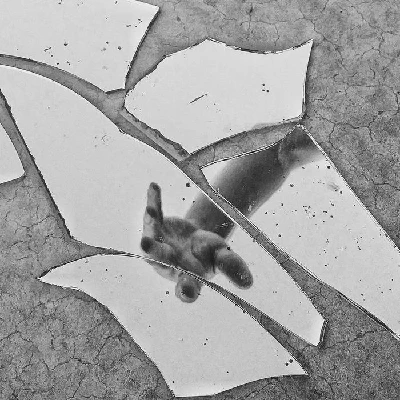
|
| Evocative and thoughtful post-punk on second EP from Leicester/Liverpool/Basildon group Moon Under Water |
| First Quarter (2021) |
most viewed articles
current edition
John McKay - InterviewCathode Ray - Interview
Robert Forster - Interview
When Rivers Meet - Waterfront, Norwich, 29/5/2025
Spear Of Destiny - Interview
Fiona Hutchings - Interview
Carl Ewens - David Bowie 1964 to 1982 On Track: Every Album, Every Song
Chris Wade - Interview
Shrag - Huw Stephens Session 08.12.10 and Marc Riley Session 21.03.12
Brian Wilson - Ten Songs That Made Me Love...
previous editions
Heavenly - P.U.N.K. Girl EPBoomtown Rats - Ten Songs That Made Me Love....
Manic Street Preachers - (Gig of a Lifetime) Millennium Stadium, Cardiff, December 1999
Allan Clarke - Interview
Oasis - Oasis, Earl's Court, London, 1995
Barrie Barlow - Interview
Beautiful South - Ten Songs That Made Me Love...
Pixies - Ten Songs That Made Me Love...
Chuck Prophet - Ten Songs That Made Me Love...
Dwina Gibb - Interview
most viewed reviews
current edition
Peter Doolan - I Am a Tree Rooted to the Spot and a Snake Moves Around Me,in a CircleVinny Peculiar - Things Too Long Left Unsaid
Garbage - Let All That We Imagine Be The Light
Vultures - Liz Kershaw Session 16.06.88
John McKay - Sixes and #Sevens
Little Simz - Lotus
HAIM - I Quit
Pulp - More
Lapsley - I'm a Hurricane, I'm a Woman In Love
Billy Nomates - Metalhorse
Pennyblackmusic Regular Contributors
Adrian Janes
Amanda J. Window
Andrew Twambley
Anthony Dhanendran
Benjamin Howarth
Cila Warncke
Daniel Cressey
Darren Aston
Dastardly
Dave Goodwin
Denzil Watson
Dominic B. Simpson
Eoghan Lyng
Fiona Hutchings
Harry Sherriff
Helen Tipping
Jamie Rowland
John Clarkson
Julie Cruickshank
Kimberly Bright
Lisa Torem
Maarten Schiethart